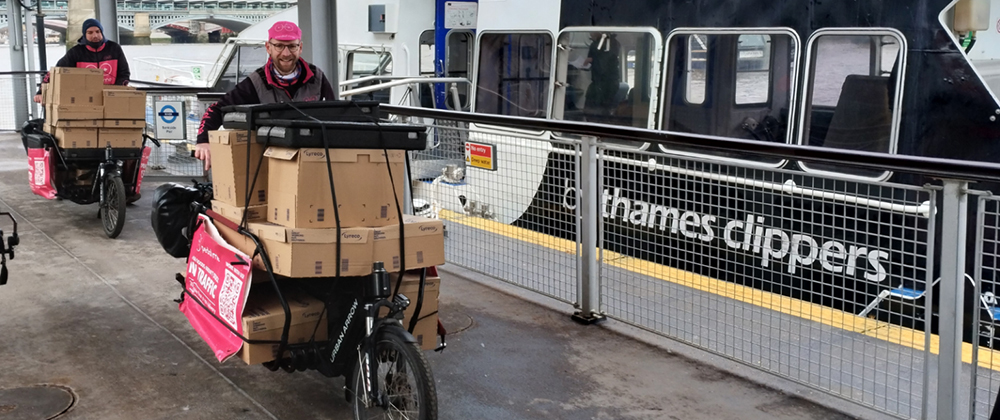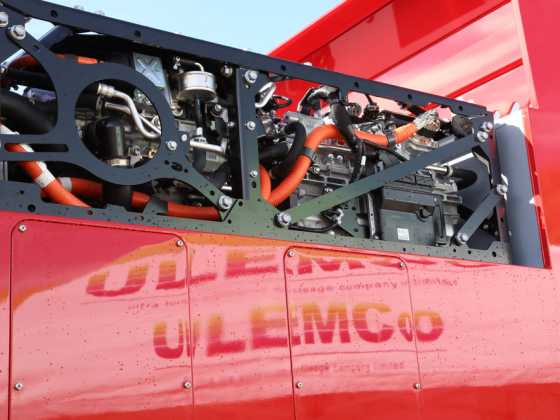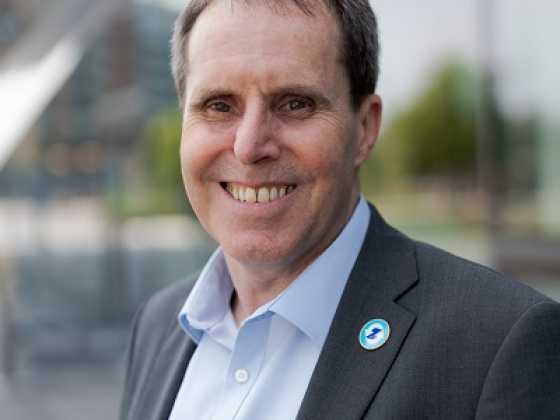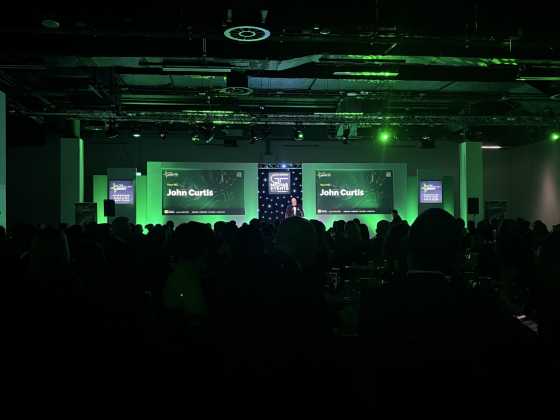Finding ways to green London’s freight

The Cross River Partnership shares its latest work on supporting the logistics sector in London with alternative, non-road freight modes, including rail and river
Cross River Partnership (CRP) is a non-profit and impartial partnership organisation that has been delivering innovative projects in London since 1994. CRP’s vision is to make London a better place to live, work and visit. CRP supports public, private and voluntary organisations to address creatively challenges around Air Quality, Transport, Placemaking and Wellbeing.
CRP Purpose
CRP was originally set up to deliver physical infrastructure projects including the Millennium Bridge and the Golden Jubilee footbridges over the River Thames. Since then it has worked with partners to introduce lighting, art and businesses into railway viaducts and arches (Light at the End of the Tunnel); support workless Londoners into employment (Recruit London); and more recently, to tackle poor Air Quality.
All of these projects have required partnership working across geographical, institutional and sectoral boundaries. CRP’s partner body continues to grow and all of these partners are represented on CRP’s Board, which is co-chaired by Keith Bottomley, deputy policy chairman at the City of London Corporation, and Simon Pitkeathley, chief executive of Camden Town Unlimited and Euston Town Business Improvement Districts (BIDs). CRP’s accountable body is Westminster City Council.
Cleaner freight operations
Freight vehicles make up 15 per cent of London’s total vehicle miles but emit one quarter of London’s overall transport carbon emissions. In London, 9,400 premature deaths are attributed to poor air quality and a cost of between £1.4 and £3.7 billion a year to the health service. With continued changes to shopping behaviour that have been exacerbated by the pandemic, the number of parcels delivered in London is expected to double by 2030.
CRP is currently focussing on unlocking potential and transforming space to support the logistics sector in London with alternative, non-road freight modes including rail and river. These freight solutions are all designed to make London fairer, greener and safer.
CRP and rail freight
CRP’s latest Rail Freight Study, On track for sustainable logistics: Integrating Rail Freight into London’s deliveries, investigates the opportunity to use existing infrastructure in the London boroughs of Southwark and Lambeth to support efficient and sustainable movement of freight into Central London using rail. CRP investigated whether London’s rail network can support more of the city’s freight. Transporting more goods by train would reduce the number of polluting vans on London’s roads, improving air quality and people’s health.
The rise of low-volume, high-margin markets requiring fast delivery, such as fast-fashion, were identified as being suitable for fast rail freight.
4,000 tons of carbon dioxide (CO2) could be saved each year by using rail freight, which could take 8,300 HGVs off the road.
CRP commissioned this study with the Great British Railways Transition Team (GBRTT) as part of the Impact on Urban Health-funded Clean Air Freight (CAF) project, with support from the London boroughs of Southwark and Lambeth. This report explores how moving freight goods by rail can support their goals of reducing polluting road-freight vehicles and achieving better air quality for the residents of London.
CAF explores how to prepare for more rail freight deliveries into London, including investigating the potential of passenger trains to carry freight, and also trial zero emission last mile logistics from a potential Freight Hub at Waterloo Station.
Steer carried out this research, which follows on from CRP’s recent rail freight feasibility study, completed in June 2022.
The study identifies two concepts for a rail freight trial. The first is ‘Passengers as Parcels’, which involves using existing high speed passenger services to move low volumes of goods into and out of stations in London.
The second is a ‘Dedicated Freight Multiple Unit (FMU)’, which uses a converted high-speed passenger train to transport high volumes of goods from freight hubs into and out of London stations.
The study revealed interest from the logistics market in both concepts, to realise fast, same- day delivery into London. London Waterloo Station has been shortlisted as a good potential location for trials to take place in accommodating increased rail freight.
Amandeep Kellay, portfolio manager, Impact on Urban Health, said: “Air pollution has devastating effects on people’s health. It particularly affects the vulnerable people in our communities, like children. While the movement of goods into and around London is essential, these deliveries significantly contribute to poor air quality. A bigger role for rail in transporting freight into London would mean fewer lorries and vans entering London, faster deliveries, and cleaner air for all. This research shows that improving air quality is the right thing for our health and business.”
Lord Peter Hendy of Richmond Hill, Chair of Network Rail, said: “Great British Railways Transition Team are pleased to be supporting Cross River Partnership’s study into how Express Railfreight can positively impact emissions from the logistics sector. Rail freight presents a great opportunity to reduce transport pollutants across London through fewer vans and lorries on our roads, providing better air quality for all through the rail network.”
Councillor Rezina Chowdhury, Cabinet Member for Sustainable Lambeth and Clean Air at the London Borough of Lambeth, said: “We have a collective plan as a borough to tackle the climate emergency here in Lambeth, and to do it fairly and swiftly. This includes achieving zero direct emissions from freight, delivery and trade by 2030, an aim that this shift directly supports.”
CRP is looking forward to working with partners to get Rail Freight Trials underway.
CRP and River Freight
CRP has already launched the London Light Freight River Trial; London’s first daily, multi-supplier, river freight trial along the Thames. This forms part of the Defra-funded Clean Air Logistics for London project.
CRP has been working with the Port of London Authority, Lyreco UK & Ireland, Speedy Services, Thames Clippers Logistics, Grid Smarter Cities and Pedal Me to deliver the trial, which officially began on Monday 27th of February. The trial serves the next day delivery market and also incorporates return deliveries, highlighting how the river can enable fast, efficient and consistent deliveries in a more sustainable way.
The trial is being delivered in two phases, both leaving from Dartford International Ferry Terminal and taking approximately one hour to reach central London’s Bankside Pier. Phase 1, which was completed on 10th March, called at Bankside pier only, whilst Phase 2, called at both Trinity Buoy Wharf and Bankside pier.
For both phases, Cargo Bikes and Electric vehicles were used to deliver goods from the piers to their final destinations. At Bankside Pier, this was supported by the new dynamic loading bays which form part of the Kerb Dock project looking at the viabilities of unloading/loading activities near pier locations.
The trial is also the first river freight trial to incorporate return deliveries with returns being picked up at each pier location in addition to goods being unloaded.
Bringing goods into central London via the Thames is proven to emit less than half of the carbon of road transport, improving local air quality and congestion. CRP’s previous river freight trial found that the using the river for freight resulted in a 78 per cent saving in NOx and an 88 per cent saving in CO2 in comparison to traditional road-based delivery methods.
Sean Collins, chief executive Officer, Thames Clippers Logistics said: “It is becoming increasingly slow, difficult and expensive for businesses to move their products into central London. We have long believed in the untapped potential for the Thames to offer a fast and reliable route into the heart of the city, with the added benefit of removing commercial vehicles from the highly congested London roads. We have 24 years of experience in providing high-speed river transportation across London for commuters and visitors using the Thames, so we are excited and committed to delivering a rapid, sustainable logistics solution to meet the future needs of our Capital.”






